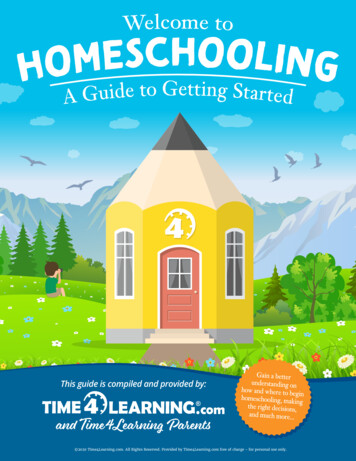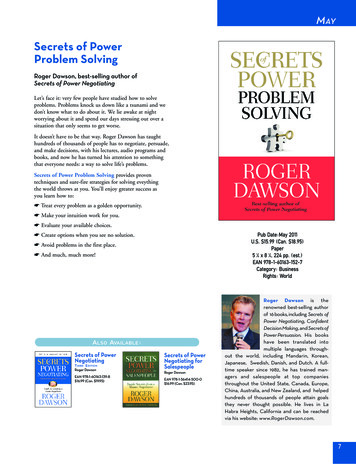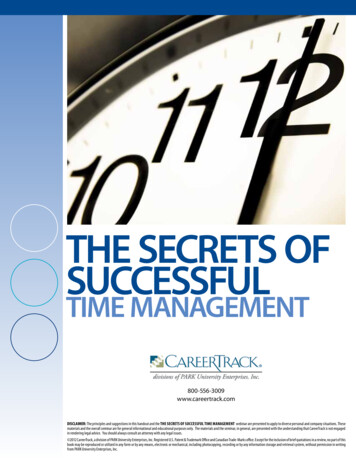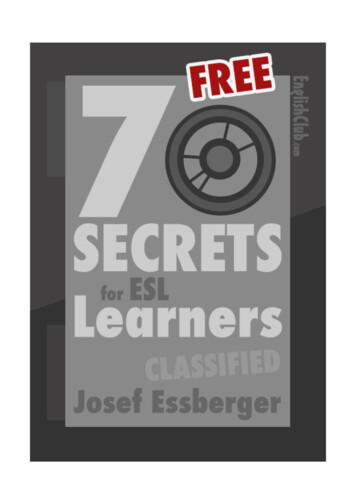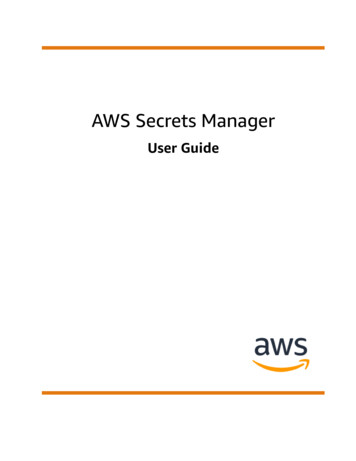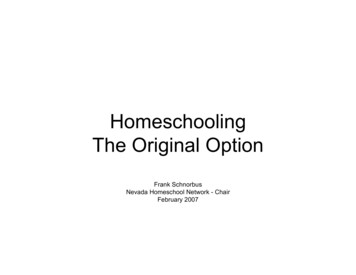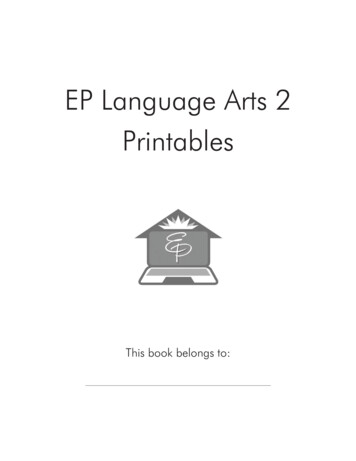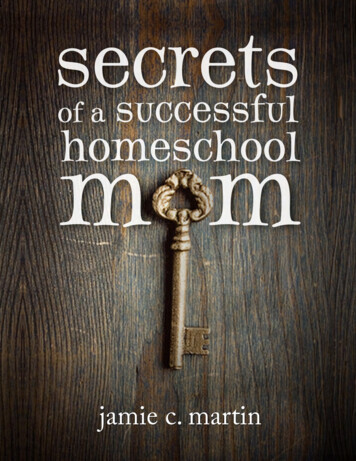
Transcription
Secrets of a Successful Homeschool Mom:A Manifesto of Freedom and Joy in Home LearningJamie C. MartinSimpleHomeschool.net2
Dedicated to new and old readers of SimpleHomeschool.net—thanks for reading, sharing, and encouraging! 2012 Simple Living Media. All Rights Reserved. No part of this book may be reproducedor transmitted in any form or by any means, electronic or mechanical, includingphotocopying, recording or by any information storage and retrieval system, without writtenpermission from the publisher, except for the inclusion of brief quotations in a review.Cover design: Design by Insight - designbyinsight.netA note about links: All Internet links in this ebook are spelled out (instead of hyperlinkingthe text directly), in case you choose to print out the book. Most of them are shortened—they look like this: lvsm.pl/O3tZCv. Type the shortened URL in your Internet browser, andit will automatically translate to the original URL. Of course, if you’re reading this digitally,you may click on the link directly.Disclosure: This book contains some affiliate links. When you purchase through them, itbenefits my family—thank you!3
Table of ContentsIntroduction. 51. The evolution of an educational philosophy—My journey of baby steps . 72. Homeschool doesn’t have to meanschool at home. . 103. It’s not about the curriculum you buy. . 114. It’s as much about your educationas it is about theirs. . 135. Go back to basics and keep school simple. . 156. Burnout is inevitable, so plan for it. 177. The most important thing you’ll ever do for the success of your homeschool. . 198. You are a good enough teacher. . 21Appendix 1: 10 questions to ask andanswer about your family . 23Appendix 2: Educational Philosophies Defined . 25About Love146 . 30About the Author . 314
IntroductionWe come from a variety of backgrounds, histories, and perspectives. From all walks of life—encompassing a vast array of beliefs, insights, and ideals. We arrive here for different reasons,yet one thing is the same.We’re here for our children. This we have in common.Most of us have something else in common as well—the insecurities hidden inside aboutwhether or not we can actually do this homeschooling thing. Often we are our biggestobstacle. We tend to get in our own way, fighting battles in our thoughts when the inevitabledoubts come knocking.It makes sense that we would feel this way, when you think about it. After all, we’ve beentaught that education is complicated. Taught that even when governments throw billions ofdollars at it, the problem can’t be solved. And we don’t have billions of dollars, so what hopedo we have? We’ve been told that education requires experts, and we don’t always feel likeone.But what if some of what we’ve been taught is not true? What if there is another way—asimpler, more natural way to learn? What if there are secrets of a successful homeschoolmom—secrets we can tap into and use to order our days and our lives?I believe there are, and I’m writing this book in the hope that they’ll inspire you the waythey’ve inspired me.When I use the word “secrets,” I don’t mean that what follows are earth-shattering ideasyou’ve never heard of before. In many areas of life, often the most profound truths remainthe most simple.I’ve called them secrets because these principles encompass ideas I wish I would have knownat the beginning of my homeschooling journey–ideas I’ve had to figure out and stumbleacross along the way. If I would have known these from the beginning, it would have helpedme approach homeschooling in a more relaxed, pressure-free way.The subtitle of this ebook is “a manifesto of freedom and joy in home learning.” Accordingto Dictionary.com, a manifesto is “a public declaration of intentions, opinions, objectives, ormotives, as one issued by a government, sovereign, or organization. From the Italian tomanifest.”We choose home education as a lifestyle because there are certain goals we hope to manifestin our families, in our children. Lifelong learning and a passion for academics are of coursetwo of those goals, but that’s not all. I want more than high test scores and parental braggingrights. I want freedom, I want joy—for my kids and for myself!5
That’s what I’m seeking to manifest as we open our books day in and day out. If that ideastirs something in your soul, then you’re in the right place. Read on and allow falseexpectations and misbeliefs to fall off like burdens no longer needed. Let’s discover togetherthe secrets of a successful homeschool mom.“It is, in fact, nothing short of a miracle that the modern methods of education have not yetentirely strangled the holy curiosity of inquiry; for this delicate plant, aside from stimulation,stands mainly in need of freedom; without this it goes to wrack and ruin without fail. It is a verygrave mistake to think that the enjoyment of seeing and searching can be promoted by means ofcoercion and a sense of duty.” Albert Einstein6
1. The evolution of an educationalphilosophy—My journey of baby stepsI wished I hadn't shown up that day. But God knew better.The late summer sun spun rainbows through the window of my minivan, as I sat in theparking lot of a church—journal and pen in hand. I had just attended my secondhomeschooling conference, and was completely freaked out.Without knowing it, I had registered for a conference on unschooling—a term I had neverheard before that day.I wasn't sure I ever wanted to hear it again.What do you mean, children don't need to be taught? How will they learn otherwise?!So before heading home, I took deep breaths and tried to make sense of this newinformation. Tried to rationalize it away with ink and words on paper.If only I could go back and tell myself what I know now.Baby Step #1: Considering HomeschoolingMy journey to homeschooling didn't begin with a search for an educational philosophy. Ididn't even know there was more than one educational philosophy!I just assumed that homeschooling meant doing "school" at home - worksheets, lessons,tests, recess, and so on. It didn't sound that appealing, to be honest. I felt like I'd alreadyserved my time in school, and didn't really want to be sentenced to another term withoutparole, if you know what I mean.But something seemed unnatural about sending my kids away for seven hours each day.They still seemed so.little. Surely, as their mama, I knew what was best for them. Or did I?I felt I owed it to them to research all the schooling options open to us before sending themon the yellow bus that stops a few doors down. That meant checking out homeschooling,too.So I read books, talked to homeschooling friends, and spent time online. One day Idiscovered a radical lady whose educational thoughts began to shape my own.7
Baby Step #2: Charlotte MasonWhen I first found out about her, Charlotte Mason’s insights on learning seemed so out ofthe box.Young kids need short lessons, exposure to a wide variety of subjects, plenty of time innature, living books, and art and music study? Now this sounded more like the education Iwould have enjoyed as a kid.I studied books like A Charlotte Mason Companion (lvsm.pl/Q0xwNG) and When ChildrenLove to Learn (lvsm.pl/Ojou13). Being the Type A parent I was, I planned out decades ofideas for future curriculum (My kids were still in preschool by the way!).Baby Step #3: Leadership EducationOver time, however, I noticed just how much my kids were learning through play and readalouds. I began to wonder, especially after that nutty conference, if maybe these unschoolingfolks were on to something?But no, no, no. I wasn't that confident.or crazy.Then one night, I read on a forum about a philosophy called Thomas Jefferson Education(also known as Leadership Education - lvsm.pl/OfGQgx). Discovering it felt like cominghome.It was less structured than Charlotte Mason, but more structured than unschooling.The phases of learning (lvsm.pl/PlBN2d) were exactly what I was looking for.Baby Step #4: Interest-Led LearningFor a while, that is. Then one day the magic of the blogosphere led me to an unschooler’sblog.Jena’s children (yarnsoftheheart.com) were grown and successful, she was a certified teacher,and she had chosen interest-led learning for her kids (basically a fancy word for, yes,unschooling).By this time I had figured out that homeschooling was a lifestyle, and each baby step tookme further away from the traditional stereotype I had started with.Each baby step made me happier and more confident in my homeschooling decision.8
Baby Step #5: Discovering UsEvery time I found a new, intriguing educational philosophy, it helped me devise my own.Few people fit within the confines of one singular type of learning. Throughhomeschooling, we piece together what we find and love, and create something new. Wemerge and blend to discover exactly what works for us.This is a process that we get to be a part of over our entire career in home education. Just likein other parts of life, we find what we need at the exact time when we need it.If we live with eyes open, that is.I wish I could go back to my minivan in summer 2008 - wish I could whisper something inthe ear of that unsettled Jamie with pen in hand."Jamie," I would tell her. "Everything's gonna be okay.""So lighten up."To think about: What is your current philosophy of education? Have you seen it evolve over time?What does it look like in your home today?9
2. Homeschool doesn’t have to mean school at home.Most new homeschoolers mistakenly believe that they must replicate a traditional schoolclassroom and methodology with their children. Of course they often don’t feel equipped todo this, so it can lead to a lot of fear.I was the same way years ago–I initially imagined having rows of desks, a flag, and having toteach six hours a day.But what experienced homeschoolers come to realize is that homeschooling is a lifestyle, nota regimen. Learning doesn’t have to be confined to specific hours–it doesn’t have to fitwithin artificial boundaries.In order to see it this way, we must step off the conveyor belt of education. For most of usthis doesn’t come naturally because that is how we were educated ourselves. The conveyorbelt means that children are grouped with peers according to age, they proceed alonglearning what officials have determined need to be learned on a certain timetable, and afterthirteen years they come off the factory line with a diploma—an official stamp deemingthem educated.The conveyor belt serves some purposes in society, but there’s absolutely no need to set oneup in our homes. Yet that is exactly what most homeschoolers do.Have you heard of Sir Ken Robinson? He’s a modern-day educational reformer, and he has alot to say about the conveyor belt model. Consider this quote from his bestselling book TheElement (lvsm.pl/NCKiE2):“The fact is that given the challenges we face, education doesn’t need to be reformed — itneeds to be transformed.The key to this transformation is not to standardize education, but to personalize it, to buildachievement on discovering the individual talents of each child, to put students in anenvironment where they want to learn and where they can naturally discover their truepassions.”Creating an individualized education is easy for us as homeschoolers—we have the perfectopportunity, providing we can summon the courage to step off the conveyor belt.The starting point for successfully doing so is recognizing that homeschool doesn’t have tomean school at home.To think about: Does it make you excited or uncomfortable to consider blurring the line betweenschool and home?10
3. It’s not about the curriculum you buy.You might be thinking, “Isn’t curriculum just a given? We need to find one, don’t we, ormaybe even several for a variety of different subjects.”Well, I have a secret to tell you: It’s not about the curriculum you buy; it’s about theatmosphere you create.Searching for the right curriculum is exactly what I did when I first began considering thiseducational path. Not only that, but I felt like I was doing a disservice to my kids and theirfuture if didn’t look at every option so I did. Which left me exhausted before I’d evenstarted.It’s all too easy to get consumed by the hunt for the “perfect” curriculum. Even if we find aresource that works well, we sometimes wrestle with a gnawing sense of anxiety wonderingif the grass is greener over on someone else’s bookshelf.We are incredibly blessed to have so many homeschooling resources at our fingertips, but thelimitless options can also become a distraction. I believe we’ll feel more relaxed ashomeschooling parents when we realize that that the atmosphere we create in our homesis just as important as any curriculum we bring into it.Of course this leads to the question, “What type of atmosphere do we want?”The answer?An atmosphere of inspiration.Imagine the most inspiring place you’ve ever been. Maybe your memory will take yousomewhere in nature, maybe just a cozy armchair where you read an amazing book, maybe alecture hall where you heard someone speak.When you were there, what did you want to do?Inspiration demands a response.When we surround our kids with inspiration—in art, in books, in resources, in the peace weaim for in our homes—we create the optimal conditions for learning to happen naturally.Curriculum can of course be one part of that. But if we only progress through page afterpage of someone else’s resource day after day, soon we’re likely to find that we’ve madeanother educational conveyer belt in our homes. We may even find that we’ve lost thepassion that made us want to homeschool in the first place.11
We need to follow the spark of life, the energy, the passion. We need to bring into ourhomes the resources we’re led to. We also need to be willing to let go of the ones that are nolonger working for our families.It’s not about the curriculum you buy; it’s about the atmosphere you create.To think about: Have you ever found yourself consumed by the hunt for the perfect curriculum?What is one practical step you could take today to add more inspiration to your home?12
4. It’s as much about your educationas it is about theirs.Most of us start out all wrong when we begin homeschooling. We rush around looking atcurricula; we panic because the kids would rather be playing outside, or building with Legos,than doing that boring worksheet.But here’s what we’re missing when we allow those other things to sidetrack our minds:It all starts with us. It’s as much about our education as it is about theirs.We are mistaken if we believe that our job as a homeschooling parent is to educate our child.On the surface that might sound surprising, but really it’s just common sense.If you step back you realize that actually educating your children is impossible. Here’s thetruth: You can force a child to sit somewhere, most traditional classrooms do, but youcannot and never will be able to force a child to learn.Charlotte Mason, an educational pioneer from 19th century England, summed it up wellwhen she said this:“Self-education is the only possible education; the rest is mere veneer laid on the surface of achild’s nature.”When we’re able to let go of this false notion and heavy responsibility, we’ll discover a newfreedom. We’ll also discover what our job actually is: to create an inspiring atmosphere andto educate ourselves. This is where it gets fun–because this is where we get to develop andnurture our own passions.I am a writer, and because of that I have time carved out in my day for writing. My childrenknow Mommy is a writer—they see me write, they see that I make it a priority in my day.Therefore writing is a given in our home—it has become a natural aspect of life that mychildren are interested in and want to do.My two older kids regularly spend time writing and creating books of their own—asking forhelp with spelling, reading their books back to me, practicing their handwriting—and allfrom their own motivation as a result of seeing this modeled for them.You may or may not be a writer, but you are something. Something valuable and important!Something that will naturally lead to all sorts of other beautiful learning opportunities foryour family, if you only have the courage to let that something out.13
You may be a baker, an artist, an athlete, a scientist—whatever you are, be that! This is partof the gift you bring as a guide and mentor to the children in your home.It’s as much about your education as it is about theirs.To think about: How do you plan to continue your education and live out your passionswhile homeschooling?14
5. Go back to basics and keep school simple.Schooling at home relieves us of many complications that traditional schoolers face: There'sno rushing kids to the bus stop, no packing lunches the night before, and no after schoolpickups required.But sometimes the complications in homeschooling arise from within—from the knowledgeof the responsibility we have taken for our children's education. If results don't turn out asplanned or hoped, there's no school system or teacher to blame.Often, in my own life, it can be my fears that complicate matters.That's why we need reminders of how to keep school at home simple. What is actuallyneeded and required? What is beneficial and a blessing in our family?Constant tension in a home is not what most of us had in mind when we signed up for thisgig. Therefore we need to accomplish what is truly important and let go of unrealistic,unnecessary expectations.Use these ideas to help you learn to let go.1. Books and MathThis post, The Bare Minimum (lvsm.pl/RSiQVH), comforted me to no end when I read ityears ago.In it Jena suggests that the bare minimum a homeschooling family should do is to surroundyour children with literature and to do math at least once a week. The rest of the hours inthe day can be spent exploring a child's own educational interests.Jena has the experience to back up her philosophy—her three children have all graduatedfrom homeschooling and gone on to successful college placements and careers.2. The 7th Grade ReminderI once heard speaker and writer Joyce Herzog (lvsm.pl/OfLfAe) give several messages at ahomeschooling convention I attended. She has decades of experience in the traditionalschool system and now consults for homeschooling families.Joyce said that 90% of what a child learns before they enter 7th grade (Age 12/13) will beforgotten. This tells me that before that age, our main focus as parents should be creating aneducational environment in our homes, rather than focusing on specific skills or15
information. Of the utmost importance is to help our children retain their love of learning,so that after 7th grade they'll be self-motivated to continue it.3. Leadership Education GoalsA year ago I printed out the following three goals, described in the book LeadershipEducation (lvsm.pl/OfGQgx), and included it on my daily routine. This list inspires meimmensely—especially when overwhelming days arise.The three jobs of a leadership education parent are to:1. Develop, nurture, and heal family relationships.2. Create an inspiring environment.3. Respond effectively to your children's inspiration.Sound easy? It is! I know I can accomplish those goals, and if I can—so can you.When those homeschooling fears rear their ugly heads, tell them to head back where theybelong. Remember that the investment you're making into the lives of your family will reapan awesome return in the near future.To think about: How can you go back to basics and keep school simple? Are there unrealisticexpectations that are keeping you from enjoying this lifestyle more?16
6. Burnout is inevitable, so plan for it.I know I may shock some of you by mentioning this, but not every homeschool day lookslike Little House on the Prairie.Some days look more like Nightmare on Elm Street.Instead of hardworking kids listening to Mom, it could be that you reach a season whereyour days consist more of policing sibling squabbles and just trying to have everyone make itthrough until bedtime. I speak from personal experience!I do not believe that homeschooling is the right choice for every family in every season. Butit does make me feel saddened when I see a family stop purely because of burnout. Equallysad is when families continue on, but without any of the joy they once had.Over time, as I've traveled this path myself and have met many homeschooling parents, I'venoticed certain qualities that can lead a mama to lose her spark.Here are ten ways to burn yourself out as a homeschooling mother:1. Structure your home just like a school building—complete with a flag and desks.2. Plan your homeschooling day's schedule to look exactly as it would at the school down thestreet.3. Whatever the cost, trudge through that curriculum you bought cover to cover, in spite ofthe fact that both you and your children became bored three months ago.4. Stay home at all times and never meet up with your friends.5. Begin when your child is in Kindergarten to plan his entire homeschooling career untilhigh school, including how you plan to teach algebra.6. Never attend any homeschooling conferences or groups in your area.7. Don't read any homeschooling books, blogs, or forums online.8. Spend too much time reading homeschooling books, blogs, or forums online—and be sureto compare yourself to what everyone else is doing.9. Give up all your outside interests in order to serve your family and children—who needsfree time anyway?10. Don't pay any attention to your cues or your children's cues when they tell you it's timefor a change or a break.17
I remember when I first considered homeschooling it was the 24/7ness of the prospect that Ifound most daunting. Years later I still feel that way. I find that my kids’ educations don’tworry me nearly as much as the burnout that can result from this lifestyle.I felt validated and encouraged on this topic when I came across the book A Mother’s Rule ofLife (lvsm.pl/Pq5ehB). It’s written by a Canadian homeschooling mother of five, HollyPierlot.In this passage Holly explains why she developed a “Mother’s Sabbath:”“So many times over my years as a mother, I had felt tired, overwhelmed, and worn out. Sooften I felt I couldn’t get any personal space to think, what with the continual onslaught of“Mummy! Mummy!” coming from the children, or the work that I hadn’t finished staringme in the face.I needed quiet time alone.”Moms need time away from our children in the same way that office workers need time awayfrom the office. It’s not about not loving our families enough; it’s about the ability tomaintain perspective and joy in all we’re doing.We won’t get that time if we don’t plan for it.At the very least, plan a quiet rest period in your day no matter how old your kids are—evenwhen they outgrow naptime. I also have a sitter that comes once a week for five hours. Youmay need a mother’s helper—maybe you live close to family or just have another momfriend you can switch with. Another idea is taking off every other Saturday while yourhusband is home–this is what Holly Pierlot did for her Mother’s Sabbath.If we recognize that burnout will sometimes creep up on us, we’ll be prepared. If we neverexpect it, it can totally throw us and lead to unhappiness, depression, and putting kids inschool when that isn’t really our heart’s desire.We all go through seasons of ups and downs. One of the advantages of the homeschoolinglifestyle is that, more or less, we get to manage our days the way we choose. But sometimesthrough our choices we neglect ourselves.Homeschooling should bring life and joy to everyone in the family. If that's not what you'reexperiencing, take the time to consider where you burned out along the way, and what youcan do to light your spark again.To think about: Have you experienced burnout as a homeschool mom? How can you plan toalleviate this in the future?18
7. The most important thing you’ll ever do for thesuccess of your homeschool.Wouldn’t it be great if we could see our role as homeschooling parents boiled down to onemain goal–one idea that would ensure the development of a successful homeschoolingfoundation?Knowing this one tip would mean that when everything starts to crumble around us, we’dknow exactly what to do to get back on track.Well, there is such a tip! It’s magical, it’s natural, and above all it’s simple.The most important thing you’ll ever do for the success of your homeschool is this:Nurture relationships.That’s it! Today and every day when you wake in the morning, your job as a homeschoolparent is to nurture and build relationships.And here’s the reason why: Education thrives when relationships are nurtured.You’ll see this if you think back to your own school career and history. Many of us who wereeducated traditionally had at least one or more teachers who took a special interest in us,teachers with whom we had a shared connection.Often that was the class in which we learned the most and the class we enjoyed the most–therelationship mattered.In my case I remember my 7th grade English teacher, Mrs. Sarvis. That was the year I decidedthat I wanted to be an author. I spent much of my free time writing, at both home andschool. My mind can still see that purple spiral notebook as if it was yesterday. Oneafternoon Mrs. Sarvis offered to take my scribbles home with her to read in the evening.Looking back I’m certain that my stories weren’t all that remarkable, but her response was.She took the time to encourage me, and her encouragement fanned the flame of my dream.As both teachers and parents, we have even more power to nurture the relationships of thosewe love most in ways that will help their learning explode and take off.A few months ago a comment came in on one of my posts from a seasoned homeschoolingmom. I was so moved by Debra’s words and experiences that I asked her if I could sharethem with you:19
“I have been homeschooling my eight children (currently ages 8 to 29) for over twenty- three yearsand there have been many hard times when I wanted to quit. However, I haven’t because thisroad has been the best one for my family despite the trials.Homeschooling has continued through marriage and church problems, health and emotionalproblems, elder parent issues and deaths, three miscarriages, and one bout of cancer.And as I continue on I have come to know that the journey was never about how competent I amin any school subject, but is about my relationship with my children, my husband, and my God.Period.If those are a priority everything else will work out.My oldest son is one of my favorite examples of how it never was about how good a teacher I couldbe. Despite my personal trials during his high school years, and in spite of never doing any kind offormal science (because of having so many younger children), my son found his passion for biologyin college. He studied hard; he networked with teachers. He was offered full graduate schoolscholarships to MIT and Harvard. He found his way.I know this is not a checklist of how to do it, but I hope there is some encouragement in knowingthat it can all work out if our priorities are firmly set before our eyes.”We will have many times when we feel unqualified and in over our heads on this journey,but when everything else falls apart we can go back to basics. We can nurture relationships.That’s what mothers are brilliant at and always have been.So when doubt or fear try to overtake us, we must make that the priority—it will set thecourse for the future success of both our homeschool and our entire family.To think about: Have you seen the power of relationships open doors to learning in your family?What do you need to do today to nurture and cultivate your family’s relationships more deeply?20
8. You are a good enough teacher.When you begin homeschooling, you may experience a variety of emotions. Sometimes it’sthe excitement of anticipation—as curriculum boxes and supplies arrive at your home via theFedEx truck. You're looking forward to developing your routine of homeschooling life.Other times, however, might not feel quite so uplifting. Maybe you're wondering if youreally have what it takes. Or maybe the bickering level has been so high in your homerecently that you question if it's even worth it.Maybe you're just struggling to make it through the day.Feelings of insecurity can certainly add up in the heart of a homeschooling mom or dad. Wewant the best for our children, of course. But some days we question if the best is us.How can you know if you are a good enough teacher? Ask yourself the following questions.1. Are you qualified?Back when I didn't know anything about homeschooling or educational philosophies, Icouldn't have ever envisioned myself as a homeschooling parent. I'm not a certified teacher,after all! Our Western lives are full of experts and we're conditioned by our society to lookfor a piece of framed paper on a wall to signify that we have what it takes.But consider this study (lvsm.pl/OxIsIa)
philosophy—My journey of baby steps I wished I hadn't shown up that day. But God knew better. The late summer sun spun rainbows through the window of my minivan, as I sat in the parking lot of a church—journal and pen in hand. I had just attended my second
